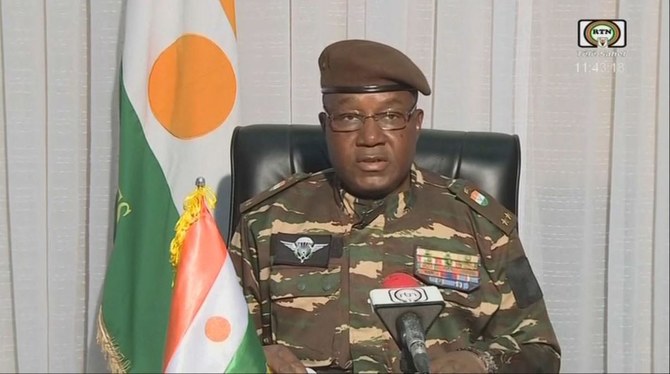The mutinous soldiers who overthrew democratically elected Niger President Mohamed Bazoum announced a raft of measures over the weekend that analysts say are aimed at strengthening their grip on power while preparing to defend against any military attempt by regional leaders to reinstate Bazoum.
The junta led by Brig. Gen. Abdrahmane Tchiani ordered the Nigerien armed forces to go on maximum alert over “threats of aggression to the national territory” and asked the military-led governments of neighboring Mali and Burkina Faso to send troops to help defend them. It also issued a Monday deadline to the French ambassador to leave the country and held a rally to gather support to force French troops out.
France President Emmanuel Macron said Monday that the country’s ambassador will remain in Niger. Macron spoke out firmly against the coup leaders while insisting that France is not Niger’s enemy.
“Our policy is the right one. It depends on the courage of President Mohamed Bazoum, the commitment of our diplomats, and of our ambassador on the ground who is remaining despite pressure,” Macron told a gathering of French ambassadors in Paris.
Seidik Abba, a Nigerien researcher and president of the Paris-based International Center for Reflection and Studies on the Sahel, said the junta is trying to reinforce its position and rebuff attempts by West Africa’s regional bloc, ECOWAS, to pressure the military government to reverse the coup.
“The risk of a war (between Niger and the regional bloc) is still pretty high,” said Nate Allen, an associate professor at the Africa Center for Strategic Studies. He said the junta is aligning with the regimes in Mali and Burkina Faso in “a very strong anti-Western and pro-authoritarian orientation.”
ECOWAS has said it must reverse the coup in Niger to “halt the spiral of coups” in West Africa. At a meeting Saturday with Molly Phee, the top U.S. diplomat for African affairs, the bloc’s chairman, Nigerian President Bola Tinubu, accused the Niger junta of trying to “buy time” after failed talks to reinstate Bazoum, who remains in detention.
“The ECOWAS consensus is that we will not allow anyone to insincerely buy time,” Tinubu said, adding that he has been holding the bloc back “despite its readiness for all options” that could include military intervention in Niger.
Before Bazoum’s ouster last month, Niger, a former French colony, was seen as the West’s last major partner against jihadi violence in the Sahel region below the Sahara Desert rife with anti-French sentiment. The cutting of ties with the French, as occurred after the military coups in Mali and Burkina Faso, shows “a new world order that is emerging in the Sahel and in a way marks the end of the post-colonial state in a lot of these countries” colonized by France, said Abba, the Sahel researcher.
ECOWAS has not provided details of what a military intervention would look like, other than that it would be led by a so-called standby force. Mali and Burkina Faso are both battling with internal security challenges, while Nigeria, which also faces deadly violence, constitutes roughly half of about 450,000 combined military personnel in the bloc’s remaining 11 member states. Guinea is also among the countries that have sided with Niger.
The bloc is in a challenging position with the Niger-Mali-Burkina Faso alliance and with its past interventions often reliant on international support, said Allen with the Africa Center for Strategic Studies.
The coup leaders in Niger “are planning on staying in power for the long term,” he said. “That is a typical pattern we have seen in military regimes ... they overstay their welcome often for a very long time.”
Source: AP






